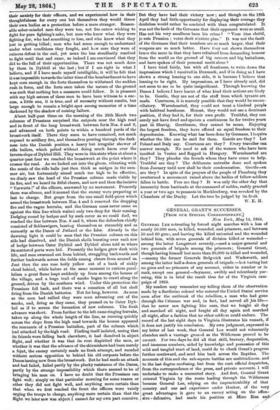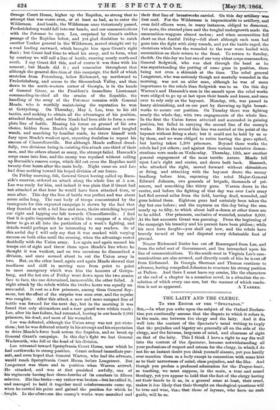GENERAL GRANT'S SUCCESSES.
[Facat OCTR SPECIAL CORRESPONDENT.]
New York, May 14, 1864. GENERAL LEE retreating by forced night marches with a loss of nearly 50,000 men, in killed, wounded, and prisoners, and between 50 and 60 gums and leaving the killed unburied and the wounded behind him, with seven generals of division killed or wounded— among the latter Longstreet severely,—and a major-general and two generals of brigade among the prisoners ; General Grant, though having himself lost more than 20,000 in killed and wounded, —among the former Generals Sedgwick and Wadsworth, and among the latter half-a-dozen generals of brigade—but having lost no guns and no prisoners of any account, either in number or in rank, except one general—Seymour, swiftly and relentlessly pur- suing, this is in brief the result thus far of the Virginia cam- paign of 1864.
My readers may remember my telling them of the observation made by a Sardinian colonel who entered the United States' service soon after the outbreak of the rebellion, a man who had gone through the Crimean war and, in fact, had served all ,his life— that he never saw fighting like ours, that we fought all day and marched all night, and fought all day again and marched all night, after a fashion that no other soldiers could endure. The record of the last eight days in Virginia illustrates his remark, if it does not justify his conclusion. My own judgment, expressed in my letter of last week, that General Lee would not voluntarily abandon such a vantage ground as the Wilderness proved to be correct. For two days he did all that skill, bravery, desperation, and immense numbers, aided by knowledge and possession of this wild and tangled tract of land, could do to check Grant's progress further southward, and send him back across the Rapidan. The accounts of this and the subsequent battles are multitudinous, and to the last degree confusing, but from the curt official despatches, from the correspondence of the press, and private accounts, I will undertake to make a connected story. And first, General Grant entered Virginia by the route leading through the Wilderness because General Lee, relying on the impracticability of that country and our sad experience under Hooker, of the very
z great advantages it gave to an enemy acting on the offen- sive - defensive, had made his position at Mine Run ayly
Orange Court House, higher up the Rapidan, so strong that to attempt that was worse even, or at least as bad, as to enter the Wilderness. And beside, the Wilderness once victoriously passed, Fredericksburg would fall into our hands, and our communications with the Potomac be open. Lee, surprised by Grant's sudden passage of the Rapidan below, and yet glad doubtless to catch another Yankee general in the Wilderness, moved straight out by a road leading eastward, which brought him upon Grant's right flank ; but Grant had time to wheel his army, and to form, what by courtesy we will call a line of battle, running nearly north and south. I say Grant did this, and of course it was done with his consent ; but Meade did it ; and remember throughout that although the general direction of this campaign, the field of which stretches from Petersburg, below Richmond, up northward to Fredericksburg, and across to the Shenandoah Valley, and then down to the north-western corner of Georgia, is in the hands of General Grant, as the President's immediate Lieutenant commanding-in-chief all the armies of the Republic, the handling of the army of the Potomac remains with General Meade, who is worthily maintaining the reputation he won at Gettysburg. On Thursday, May 5, Lee, true to his old tactics, and seeking to obtain all the advantages of his position, attacked furiously, and before Meade had been able to form _a com- plete line of battle. Massing his forces on ground of his own choice, hidden from Meade's sight by undulations and tangled woods, and marching by familiar roads, he threw himself with fury upon Meade's weakest spot, expecting doubtless to repeat his success of Chancellorsville. But although Meade suffered dread- fully, two divisions losing in resisting this attack one-third of their men, and the others almost as many, the attempt failed. Elancock's corps came into line, and the enemy was repulsed without calling up Burnside's reserve corps, which did not cross the Rapidan until twenty-four hours after the main body. Night came on and Lee had done nothing toward his hoped division of our forces.
On Friday morning, 6th, General Grant having called up Barn- side's reserves, ordered an attack along the whole line at 5 a.m. Lee was ready for him, and indeed it was plain that if Grant had not attacked at that hour he would have been attacked then, or soon after. This day the line of battle was perfect and was about seven miles long. The vast body of troops concentrated by the insurgents for this expected campaign is shown by the fact that they fronted us with a full line and more, theirs stretching beyond our right and lapping our left towards Chancellorsville . I find that it is quite impossible for me within the compass of a single letter to go at all into the particulars of a week's fighting, and details would perhaps not be interesting to my readers. So of this awful day I will only say that it was marked with varying success on both sides until the evening, when the advantage rested decidedly with the Union army. Lee again and again massed his troops out of sight and threw them upon Meade's line where he thought it was weakest, and on two occasions he discomfited a division, and once seemed about to cut the Union army in two. But, on the other hand, again and again Meade showed that readiness and skill in moving men from point to point to meet emergency which won him the honours of Gettys- burg, and the hot sun of Friday went down upon the two armies face to face, the one determined, immoveable, the other foiled. A night attack by the rebels within the twelve hours was equally un- successful. It cost us a few prisoners, among them General Sey- mour, but the effect of the surprise was soon over, and the repulse was complete. After this attack a new and more compact line of battle was formed for the next day, but in the morning it was found that only skirmishers and a rear guard were within reach ; Lee, after his last failure, had retreated, leaving in our hands 2,000 prisoners, his dead, and most of his wounded.
Lee was defeated, although the Union army was not yet victo- rious; but he was defeated utterly in his attempt and his expectation to drive Meade's force back across the Rapidan, and so break up General Grant's campaign. In this day's fight we lost General Wadsworth, who fell at the head of his division.
Lee retreated toward Spotsylvania Court House, near which he had earthworks in strong position. Grant ordered immediate pur- suit, and even hoped that General Warren, who had the advance, would reach Spotsylvania Court House before Longstreet. But Longstreet was there and in position when Warren arrived. He attacked, and was at first punished awfully, one of his regiments having lost three-fourths of its numbers in fifteen minutes. His line broke—say rather was broken—but he rallied it, and managed to hold it together until reinforcements came up, when he carried his point and gained the position for which he . fought. In the afternoon the enemy's works were assaulted and
their first line of breastworks carried. On this day artillery was first used. For the Wilderness is impracticable to artillery, and even field officers were, in many instances, obliged to dismount. Yet more, the stunted pines and the tangled undergrowth made the ammunition-waggons almost useless ; and when ammunition fell short on that fearful Friday—fell short although each man had gone into the fight with sixty rounds, and yet the battle raged, the stretchers which bore the wounded to the rear were loaded with ammunition on their return to the front. To return to Sunday, the 8th. On this day we lost one of our very ablest corps commanders, General Sedgwiek, who was shot through the head as he was superintending the putting of some guns in position, there being not even a skirmish at the time. The rebel general Longstreet, who was seriously though not mortally wounded in the morning, was not an abler man, although he was of more importance to the rebels than Sedgwick was to us. On this day Warren's and Hancock's men in the assault upon the rebel works were obliged to go up at last upon their hands and knees, and once over to rely only on the bayonet. Monday, 9th, was passed in heavy skirmishing, and on our part by throwing up light breast- works to secure our position. On Tuesday there was fighting nearly the whole day, with two engagements of the whole line. In the first the Union forces attacked and succeeded in gaining position, but failed in carrying the second line of the enemy's works. But in the second this line was carried at the point of the bayonet without firing a shot; but it could not be held by us or by them, and we were obliged to retire leaving the guns spiked, but having taken 1,200 prisoners. Beyond these works the rebels had yet others ; and against these various tentative demon- strations were made on Wednesday. Thursday, 12th, saw another general engagement of the most terrific nature. Meade fell upon Lee's right and centre, and drove both back. Hancock, who attacked the right, moved forward without skirmishers or firing, and attacking with the bayonet drove the enemy headlong before him, capturing the rebel Major-General Edward Johnson, two generals of brigade, thousands of pri- soners, and something like thirty guns. Warren drove in the centre, and before the fighting of that day was over Lee's army had fled several miles from the field, leaving dead, wounded, and guns behind them. Eighteen guns had certainly been taken the day but one before ; and the captures on this day bring the sum nearly up to fifty, to which about half-a-dozen at other times are to be added. Our prisoners, exclusive of wounded, number 8,000. At the last accounts Grant was pursuing. From the beginning of the campaign his tenacity and his pursuit have been pitiless ; while his men have fought—you shall say bow, and the rebels have bravely turned at bay and disputed every debateable foot of ground.
Nearer Richmond Butler has cut off Beauregard from Lee, and from the rebel seat of Government, and lies intrenched upon his line of communications. To the south-west in Virginia Lee's com- munications are also severed, and directly south of him he is cut off from Richmond. In Georgia Sherman and Thomas continue to advance, having compelled Johnston to evacuate his strong position at Dalton. And there I must leave my armies, like the characters at the end of a chapter in a sensation novel, in a situation the re- solution of which every one sees, but the manner of which resolu-

































 Previous page
Previous page